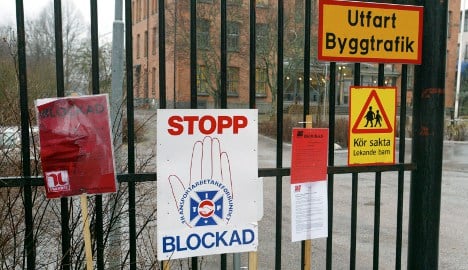VAXHOLM
Foreign workers at centre of Swedish election battle
Promises by the Social Democrats to roll back reforms to Swedish laws affecting migrant workers has put the rights of foreign workers and the power of Sweden's unions front and centre in upcoming parliamentary elections, argues liberal contributor Nima Sanandaji.
Published: 3 December 2013 15:04 CET

A scene from the Vaxholm union blockade in 2004. File photo: TT
The question of foreign workers' situation in Sweden is on its way to becoming an important topic in the upcoming election
Social Democrat leader Stefan Löfven recently promised to change legislation to ensure that “Swedish collective bargaining agreements apply in Sweden”.
The issue is centered on a fairly complicated story of how a Latvian construction company won the bid to rebuild a school in the Stockholm suburb of Vaxholm back in 2004, and in so doing had a significant impact on Swedish labour law and the country's relationship with the European Union.
At the time, Swedish labour union Byggnads, which organizes construction workers, demanded that the Latvian company follow a Swedish collective bargaining deal stipulating relatively high wages. When these demands were not met, the union blockaded the building site.
Construction was stopped and the Swedish branch of the Latvian construction company was forced into bankruptcy. Shouts of “Go home, go home!” from a Byggnads representative came to symbolize a perceived intolerance for foreign competition among Swedish blue-collar workers.
Nearly ten years have passed since the conflict started. Since the initial conflict, two Swedish unions Byggnads and Elektrikerna (which organizes electricians and joined in a sympathy action) have been forced to pay a fine for waging an illegal strike.
Sweden also passed new legislation on the rights of foreign workers, dubbed Lex Laval, reforms that unions argue made it harder to enforce collective action in the defence of foreign workers' rights.
Two weeks ago, the reforms were condemned by a European human rights body, and last week Löfven appeared with the head of Sweden's largest blue-collar trade union group, LO, promising to overturn the Lex Laval reforms should the Social Democrats assume power after the next election.
So where do the government and the opposition differ in their opinions on the subject? Lex Laval was introduced by the center-right Alliance government to bring Sweden in compliance with a 2007 European Court of Justice ruling against the unions' actions in the Vaxholm conflict.
The reforms prevent unions in Sweden from starting conflicts against foreign companies, as they did to Laval in 2004, unless foreign firms fail to adhere to minimum wags and benefit requirements set by collective agreements in Sweden.
The Social Democrats and the labour unions, on the other hand, want to give unions the right to demand higher wages than those stipulated by minimum requirements, and to start conflicts if these are not met. The International Labour Organization (ILO) as well as the European Committee on Social Rights (ECSR) have come out in favour of the latter idea.
A third perspective might be for unions to stop blockading or otherwise attacking firms that do not follow collective agreements – an option open even if the employees in the firms in question do not themselves wish to be included in such agreements. But this third perspective is hardly voiced in the Swedish debate.
The debate about the rights of foreign workers and Swedish unions has been given new life in the context of electoral politics which finds the Social Democrats fighting for the affections of blue-collar workers, many of whom are also attracted to the populist, anti-immigration rhetoric of the far-right Sweden Democrats. Indeed, nearly one in five LO members would vote for the Sweden Democrats, a November 2013 poll revealed.
However, Sweden's blue-collar workers are likely to support the Social Democrats' stance on Lex Laval. Thus restricting downward foreign pressure Swedish wages might well be an election-year promise that will move workers who have begun supporting the Sweden Democrats back into the Social Democrats.
Of course, the more free-market oriented government has criticized the Social Democrats position as being too protectionist. But protectionism on the labour market is not always unpopular politically; not least in the current situation where Sweden, like many other modern economies, is suffering from a lack of job opportunities for workers who lack higher education.
Nima Sanandaji, a Swedish writer of Kurdish origin with a PhD in polymer technology, has written numerous books and reports about subjects such as integration, entrepreneurship, and women's career opportunities. His recent book, published by Sweden's Reforminstitutet think tank, is entitled Krympande eller växande städer ('Shrinking or growing cities'). He is a regular contributor to The Local.
Url copied to clipboard!


 Please whitelist us to continue reading.
Please whitelist us to continue reading.
Member comments